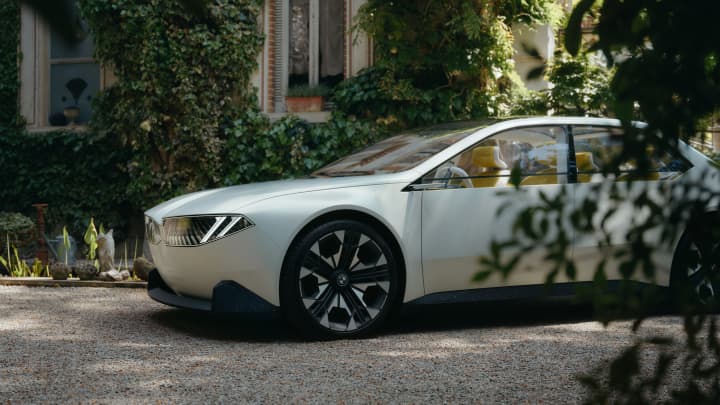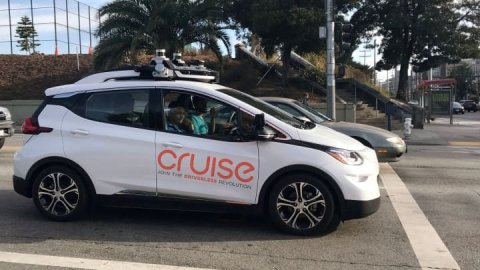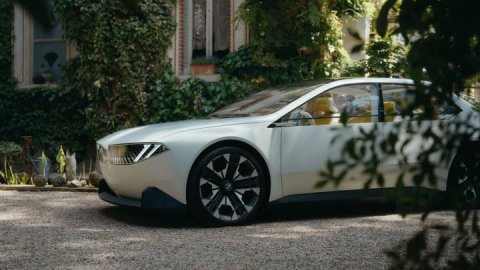
MUNICH, Germany — and are making their biggest push yet into electric cars in a bid to fend off rising competition from Chinese players and catch up with U.S. giant .
In the last few days, as part of the IAA Mobility motor show in Munich, Germany, the auto giants took the wraps off electric concept cars and new platforms for their future battery-powered vehicles.
European carmakers, which have been perceived to be behind Chinese companies like Warren Buffett-backed and Tesla, have had to move quickly to show the market they're ready to be major players in the electric era.
On Sunday, Mercedes-Benz unveiled its Concept CLA Class, an electric vehicle built on a new architecture that will underpin future battery cars from the German auto giant. The company said the concept car has a range of 750 kilometers (466 miles) as well as an ability to reach a range of 400 kilometers with just 15 minutes of charging.
Mercedes CEO Ola Kallenius talked up the car, calling it a "revolutionary development" for the German firm.
"With those efficiency numbers, that kind of range, that kind of fast charging, I am not aware of any vehicle, in that class that can match that," Kallenius told CNBC's Annette Weisbach on Sunday.
On Saturday, rival another electric concept car that highlights the company's EV ambitions. Neue Klasse is BMW's new architecture for its EVs. The first vehicles based on this platform are set to enter production in 2025.
"In only two years' time, these cars will hit the road and with that, overall, we lead BMW to a new era of innovation and sustainability. That's the purpose of our show here at the IAA," BMW CEO Oliver Zipse told CNBC's Arabile Gumede.
Zipse said BMW is going to double its EV sales this year. By the end of 2023, 15% of BMW's global sales will be battery EVs, he added.
Mercedes and BMW's dedicated EV platforms are a departure from previous architecture where they would adapt combustion engine or hybrid models and add batteries. This is the companies' biggest push yet toward a new platform for the electric vehicle era.
Analysts said that Mercedes and BMW's announcements are big steps but might leave them still lagging behind Tesla.
"The new platforms at Mercedes and BMW showcase, for the first time, what the European OEMs [original equipment manufacturers] will be capable of. These cars are likely still a year away, but their specifications show that European OEMs will be able to create compelling products," Daniel Roeska, senior research analyst at Bernstein Research, told CNBC via email.
Roeska said that these new platforms "will close a large portion of the gap" to Tesla and the Chinese players, "but not all the way."
BMW and Mercedes are wading further into an increasingly competitive electric vehicle market, broadly dominated by Tesla and various Chinese players.
Tesla commanded 20% of the global EV market in the second quarter, followed by 15% for BYD, according to Counterpoint Research.
And the competition has become more fierce thanks to a price war largely sparked by Tesla. The U.S. automaker began cutting prices in 2023, vowing to sacrifice margins in the short term for market share gain.
Mercedes and BMW both play in the premium segment of the market, where cars like Tesla's Model S and Model X compete. As they prepare to release more EVs in the coming years, Mercedes maintains its focus is not on pushing large volumes.
"We are not pushing volume, we are focusing on value over volume," Kallenius said.
Meanwhile, Volkswagen's strategy appears to be to release cars at various prices to capture different segments of the market.
The company announced Sunday that it will launch eleven new all-electric models by 2027, underscoring its EV push. In 2026, Volkswagen said it plans to launch the ID. 2all, an electric vehicle that will sell for less than 25,000 euros ($26,942).
The German auto giant showed off the ID. GTI Concept electric vehicle at the IAA show, and said a production version of the car is scheduled to hit the road in 2027.
In a world where batteries are powering cars, it's not just design of the car or the engine that is going to win over consumers. Technology is increasingly important.
"Premium EVs now need to resemble smartphones more than traditional cars to offer a similar experience to Tesla – the gold standard in EVs with its vertically integrated platform," Counterpoint said in a note last week.
Indeed, Tesla has built its business on controlling the hardware – the car itself – as well as the software that goes inside it. Musk often talks up the company's Autopilot features which allow the car to carry out some driving features autonomously. Tesla's large internal screen and apps make it feel more akin to using a smartphone.
Many of the Chinese automakers including upstarts and also market .
At the IAA conference, incumbents have also been talking up their tech prowess in a bid to show they too can match Tesla and the Chinese start-ups.
For example, BMW said its Vision Neue Klasse EV has a heads-up display that projects information on the driver's windscreen.
BMW CEO Zipse said that the Vision Neue Klass represents the "largest investment" in a car on the "digital side," which includes semiconductors.
"This is a completely digital feeling to the car," Zipse said.




